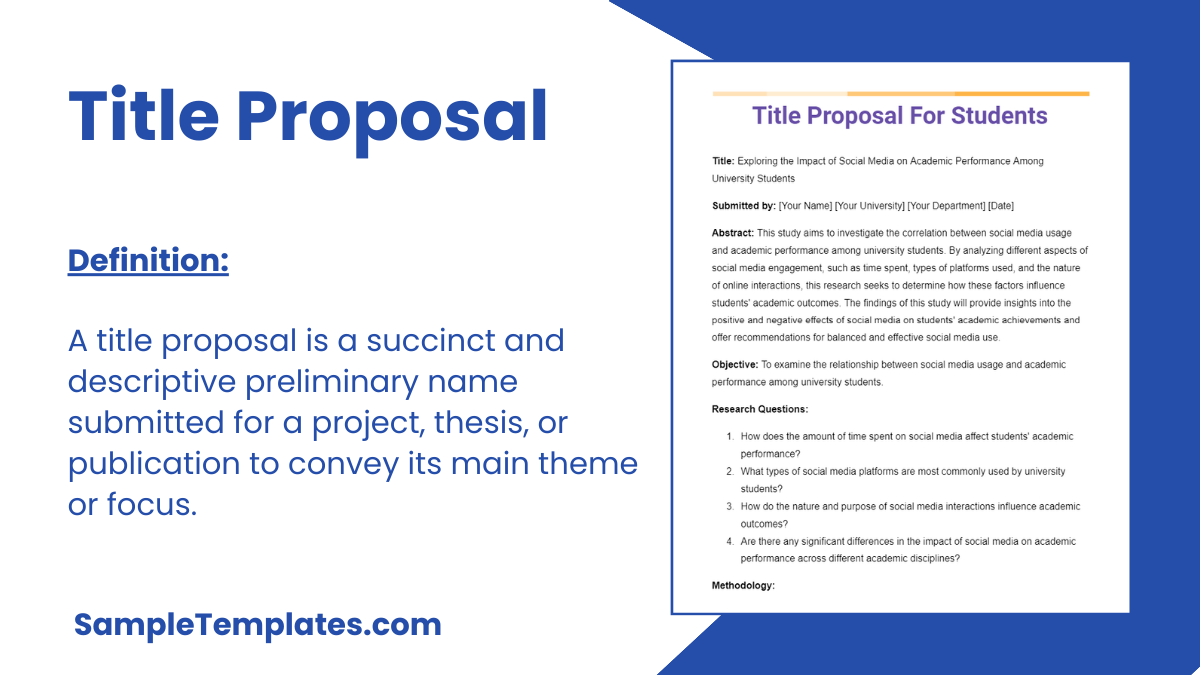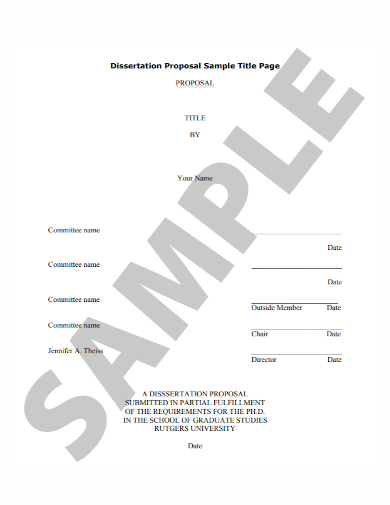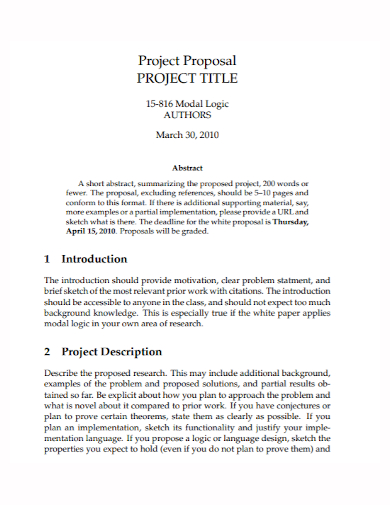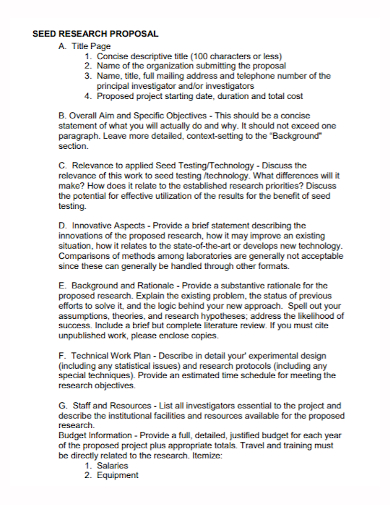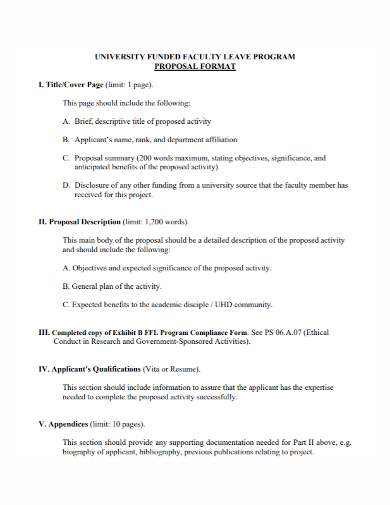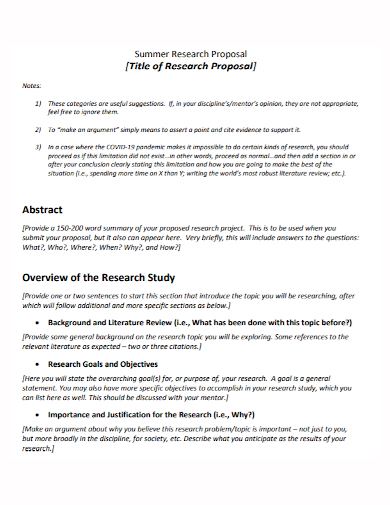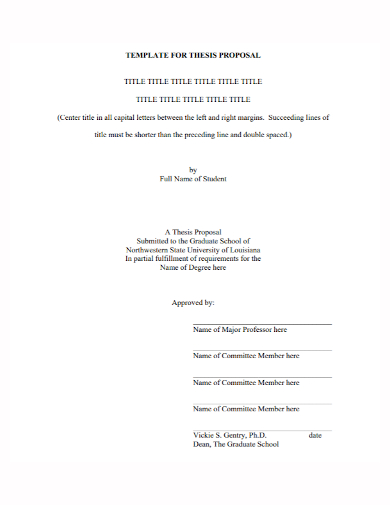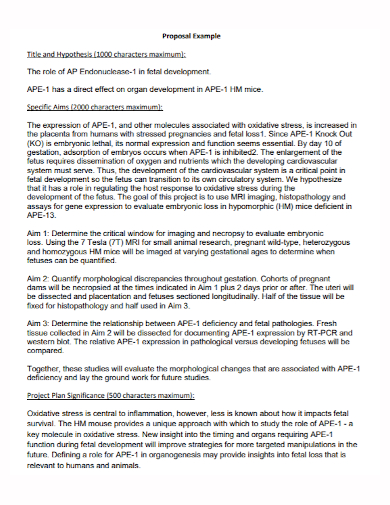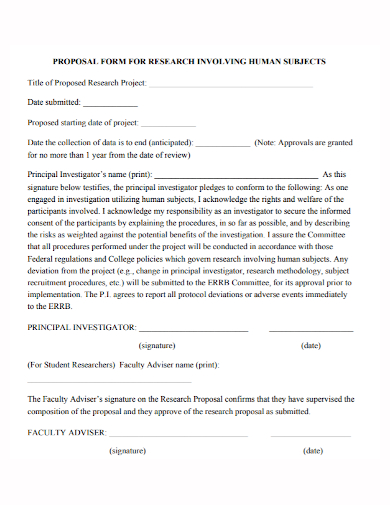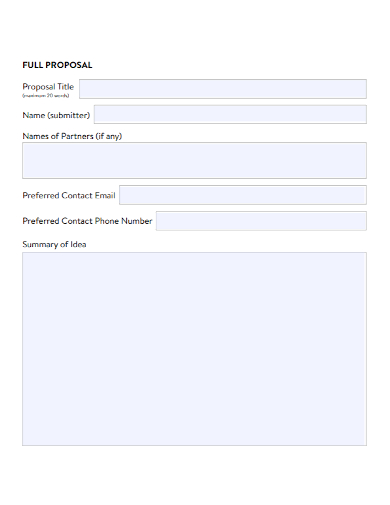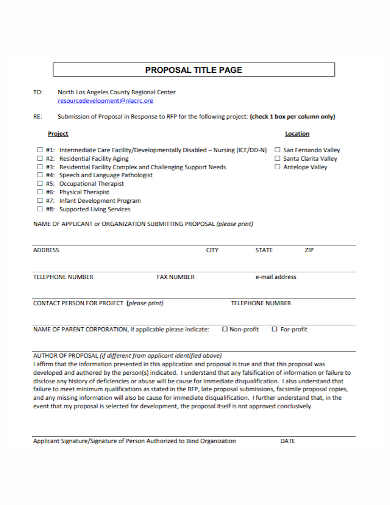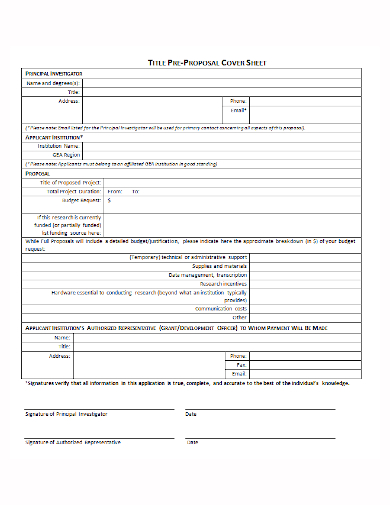Research is no strange concept to most people, after all they’ve done it at least once in school. Writing a research paper is not always a walk in the park, especially if you want your research to be interesting enough for anyone to bother reading it. It may not be discussed regularly, but formulating a good research title can be challenging. You want your research to sound like one of those published works with interesting, descriptive research titles that will definitely draw people in; after all, even if your research has the most interesting concept but has a bland title, it’s most likely to get chucked and you definitely don’t want that to happen. Research titles are important for first impression so you need to make sure it looks good. This article will give you some tips on how to create a good research title for your research proposal.
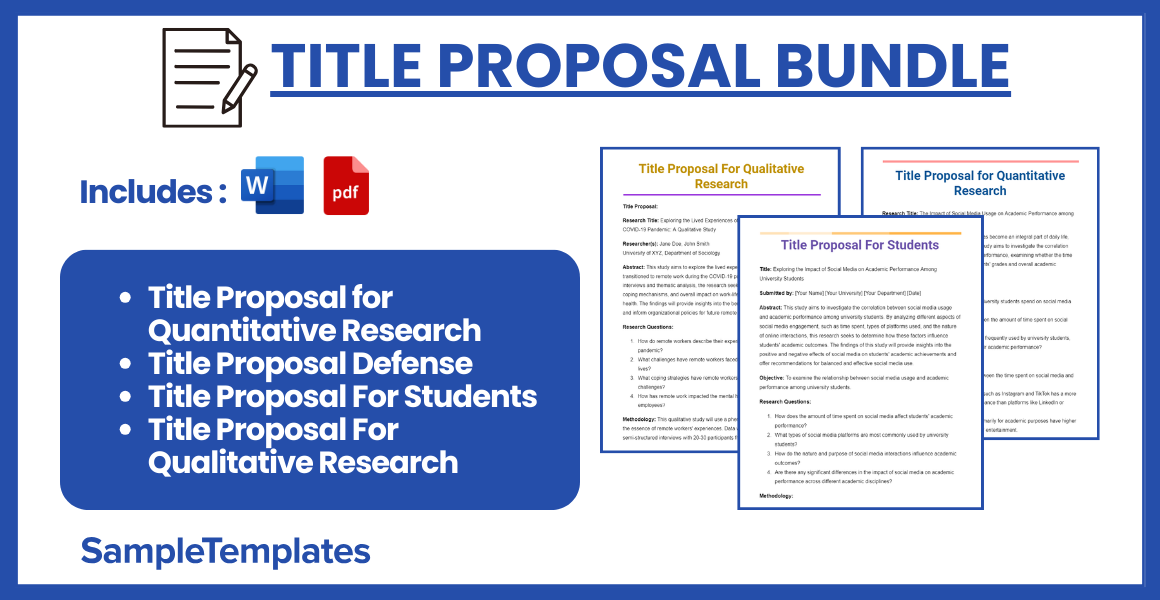
Download Title Proposal Bundle
Title Proposal for Quantitative Research
Research Title: The Impact of Social Media Usage on Academic Performance among University Students
Introduction: In recent years, social media has become an integral part of daily life, particularly among university students. This study aims to investigate the correlation between social media usage and academic performance, examining whether the time spent on social media platforms affects students’ grades and overall academic achievements.
Research Questions:
- What is the average amount of time university students spend on social media per day?
- Is there a significant relationship between the amount of time spent on social media and students’ GPA?
- Which social media platforms are most frequently used by university students, and how do these platforms impact their academic performance?
Hypotheses:
- H1: There is a negative correlation between the time spent on social media and students’ GPA.
- H2: The use of social media platforms such as Instagram and TikTok has a more significant impact on academic performance than platforms like LinkedIn or educational forums.
- H3: Students who use social media primarily for academic purposes have higher GPAs compared to those who use it for entertainment.
Methodology:
- Participants: The study will involve 300 university students from various faculties.
- Data Collection: A structured questionnaire will be used to gather data on social media usage and academic performance (self-reported GPA).
- Analysis: Pearson correlation coefficient and multiple regression analysis will be employed to analyze the data and test the hypotheses.
Significance of the Study: This research will provide insights into how social media usage affects academic performance, offering valuable information for educators, policymakers, and students. Understanding these dynamics can help in developing strategies to optimize social media use for academic success.
Timeline:
- Literature Review: 1 month
- Survey Design and Pilot Testing: 1 month
- Data Collection: 2 months
- Data Analysis: 1 month
- Report Writing: 1 month
References:
- Smith, A. (2020). Social Media Use in Academia: Impact on Student Performance. Journal of Educational Technology, 12(3), 45-56.
- Johnson, K. (2019). The Effects of Social Media on University Students. Educational Research Quarterly, 18(2), 33-48.
Budget:
- Survey Tools and Software: $500
- Participant Incentives: $1,000
- Data Analysis Software: $300
- Miscellaneous Expenses: $200
- Total Budget: $2,000
Researcher Information:
- Principal Investigator: Dr. John Doe, Department of Education, XYZ University
- Co-Investigator: Dr. Jane Smith, Department of Psychology, XYZ University
- Contact Information: [email protected], [email protected]
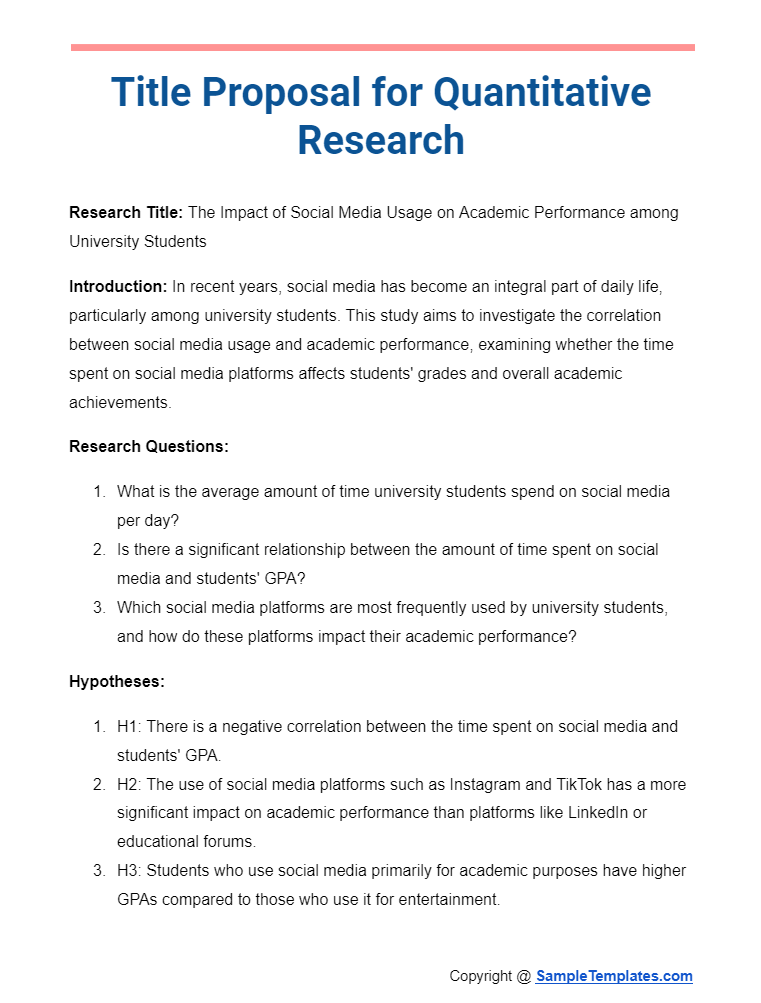
Title Proposal Defense
Introduction
Background of the Study: The rise of remote work, accelerated by the COVID-19 pandemic, has fundamentally transformed the traditional work environment, especially in the IT industry. While some organizations have adopted remote work as a permanent option, others are considering hybrid models. Understanding the impact of remote work on employee productivity and work-life balance is critical for developing effective policies and practices.
Statement of the Problem: Despite the growing popularity of remote work, its effects on productivity and work-life balance remain under-explored, particularly in the IT sector. This study aims to bridge this gap by analyzing these impacts comprehensively.
Objectives of the Study:
- To assess the impact of remote work on employee productivity in the IT industry.
- To evaluate the effects of remote work on employees’ work-life balance.
- To identify the key factors influencing productivity and work-life balance in remote work settings.
Significance of the Study: The findings from this study will provide valuable insights for IT companies, helping them to formulate strategies that enhance employee productivity and work-life balance. It will also contribute to the broader academic discourse on remote work.
Scope and Limitations: The study will focus on IT professionals working in various companies within the United States. The primary limitation is that it may not fully capture the global perspectives of remote work impacts.
Review of Related Literature
A review of existing literature on remote work reveals mixed outcomes regarding productivity and work-life balance. Some studies suggest that remote work can lead to higher productivity due to fewer distractions and more flexible working hours. However, other research indicates potential challenges, such as difficulties in separating work and personal life and the risk of burnout.
Research Methodology
Research Design: The study will employ a mixed-method approach, combining quantitative surveys and qualitative interviews to gather comprehensive data.
Data Collection Methods:
- Quantitative Data: An online survey will be distributed to IT professionals across various companies to measure productivity levels and work-life balance.
- Qualitative Data: In-depth interviews will be conducted with a subset of survey participants to gain deeper insights into their experiences with remote work.
Data Analysis Procedures: Quantitative data will be analyzed using statistical methods to identify trends and correlations. Qualitative data will be analyzed using thematic analysis to identify common themes and insights.
Expected Outcomes
The study is expected to reveal both positive and negative impacts of remote work on productivity and work-life balance. It aims to identify key factors that influence these outcomes, providing actionable recommendations for IT companies to optimize remote work practices.
References
- Smith, J. (2021). The Future of Remote Work in the IT Industry. Journal of Information Technology, 35(4), 123-136.
- Doe, A. (2020). Work-Life Balance in Remote Work: A Study of IT Professionals. International Journal of Business Research, 29(2), 45-58.
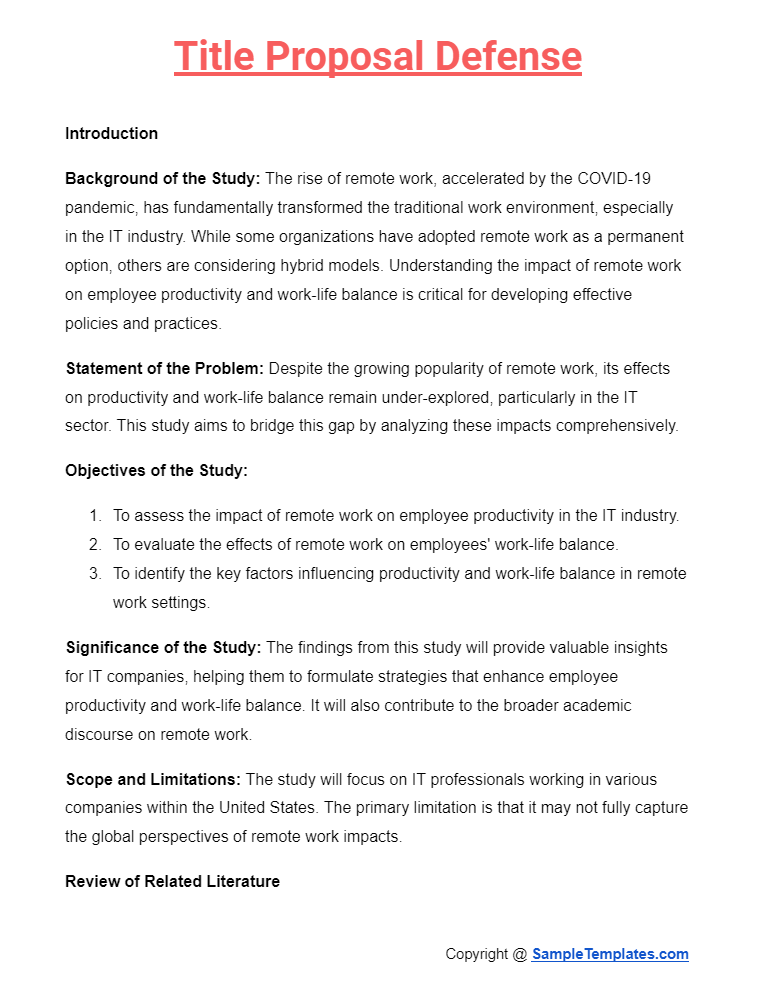
Title Proposal For Students
Title: Exploring the Impact of Social Media on Academic Performance Among University Students
Submitted by: [Your Name] [Your University] [Your Department] [Date]
Abstract: This study aims to investigate the correlation between social media usage and academic performance among university students. By analyzing different aspects of social media engagement, such as time spent, types of platforms used, and the nature of online interactions, this research seeks to determine how these factors influence students’ academic outcomes. The findings of this study will provide insights into the positive and negative effects of social media on students’ academic achievements and offer recommendations for balanced and effective social media use.
Objective: To examine the relationship between social media usage and academic performance among university students.
Research Questions:
- How does the amount of time spent on social media affect students’ academic performance?
- What types of social media platforms are most commonly used by university students?
- How do the nature and purpose of social media interactions influence academic outcomes?
- Are there any significant differences in the impact of social media on academic performance across different academic disciplines?
Methodology:
- Participants: University students from various academic disciplines.
- Data Collection: Surveys and questionnaires to gather data on social media usage patterns and academic performance.
- Data Analysis: Statistical analysis to identify correlations and potential causations.
Significance of the Study: Understanding the impact of social media on academic performance can help educators, students, and policymakers develop strategies to maximize the benefits of social media while minimizing its potential drawbacks. This research will contribute to the ongoing conversation about the role of digital technology in education and its implications for student success.
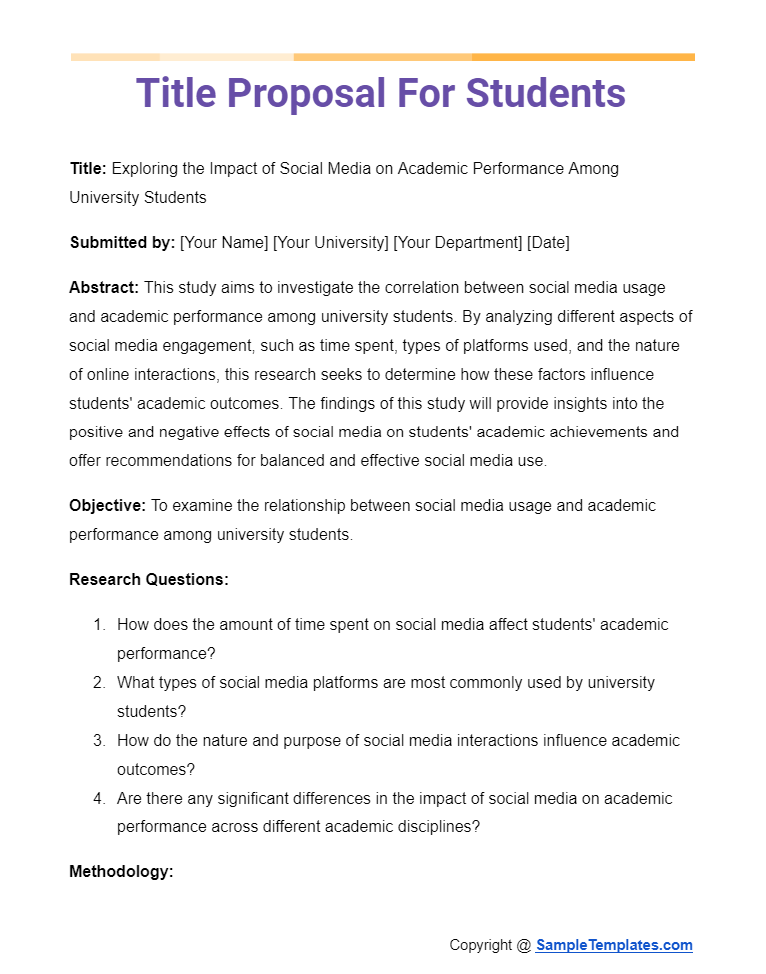
Title Proposal For Qualitative Research
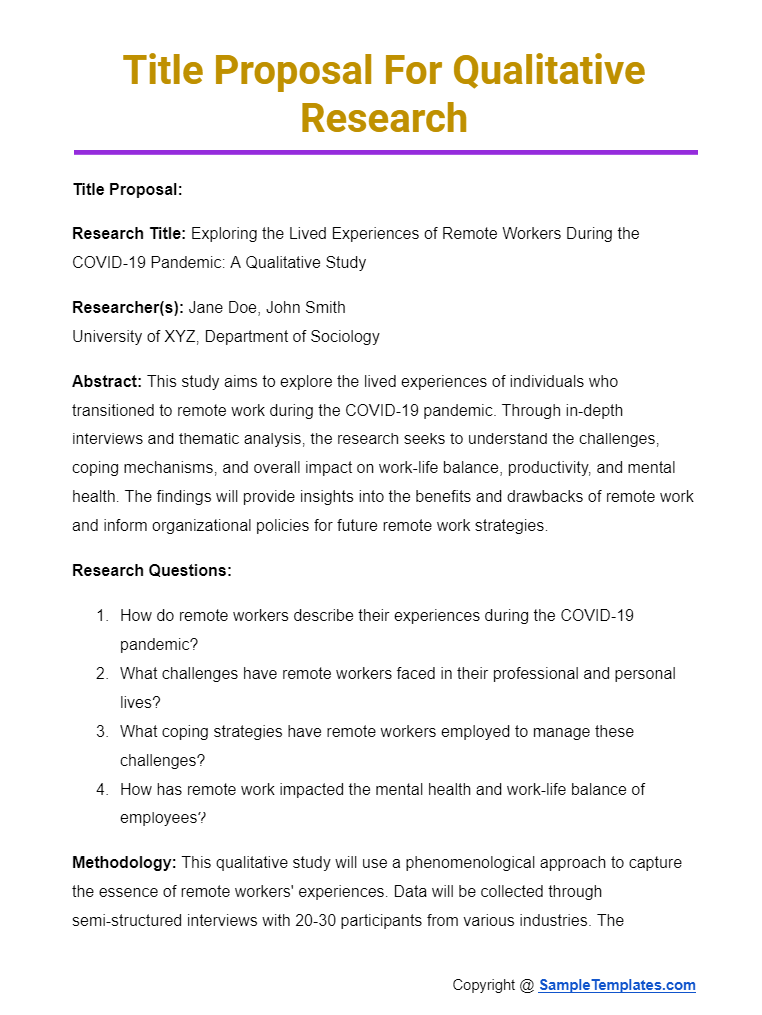
Browse More Templates On Title Proposal
1. Dissertation Title Proposal Template
2. Project Title Proposal Template
3. Research Title Proposal Format
How to Write a Title Proposal?
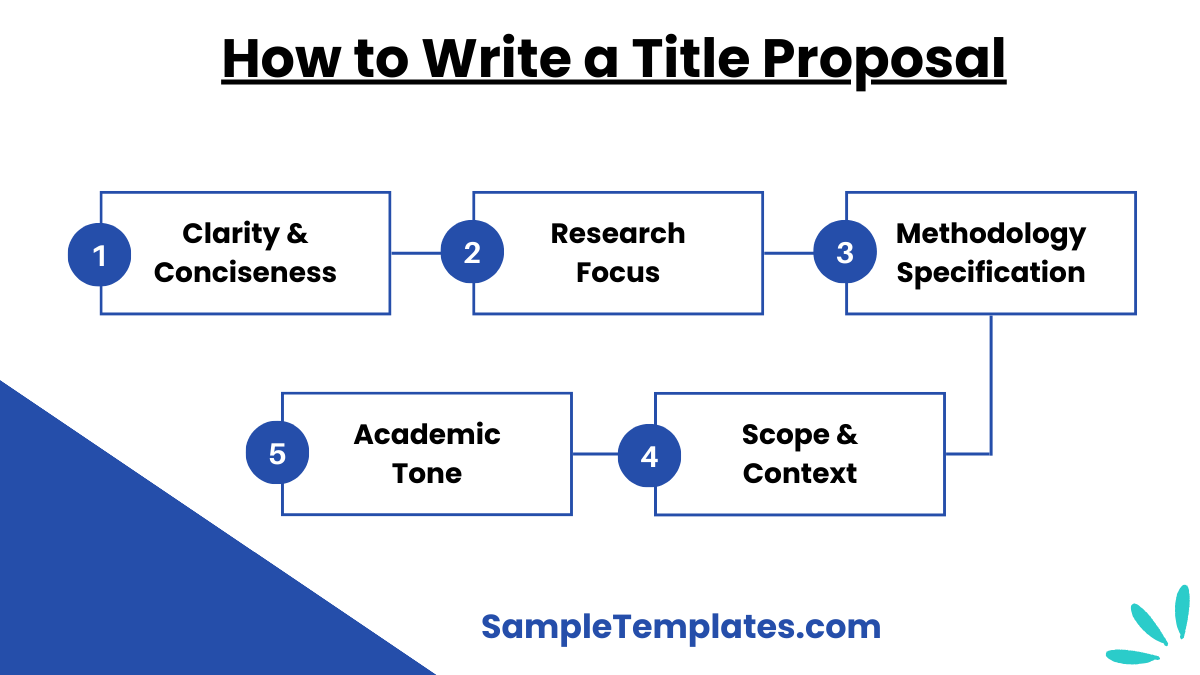
- Be Clear and Concise:
- Ensure the title is easily understandable and straight to the point.
- Avoid jargon and overly complex language.
- Reflect the Research Focus:
- Clearly indicate the main topic or issue being studied.
- Include keywords that highlight the core of your research.
- Specify the Research Methodology:
- Mention that the study is qualitative to set the expectation of the research approach.
- Words like “Exploring,” “Understanding,” “Examining,” or “Investigating” can signal a qualitative approach. You can also see more on Title Project Proposal.
- Highlight the Scope and Context:
- Indicate the population or setting of your study, such as a specific group, community, or environment.
- This helps narrow down the focus and provides context to the reader.
- Maintain Academic Tone:
- Use formal language appropriate for academic research.
- Ensure the title aligns with the conventions of your academic field. You can also see more on Health Project Proposal.
4. Faculty Program Title Proposal Template
5. Summer Research Title Proposal Template
Which is the best title for a proposal?
Choosing the best title for a sample proposal is a crucial step in capturing the reader’s attention and conveying the essence of the document. Here are some considerations and examples to guide you in crafting an effective proposal title:
Considerations for Choosing a Proposal Title:
- Clarity and Conciseness: The title should clearly convey the main idea of the proposal without being overly complex or lengthy.
- Relevance: Ensure that the title is directly related to the content of the proposal, reflecting the key objectives and outcomes.
- Engagement: Create a title that sparks interest and encourages the reader to delve into the proposal for more information.
- Professionalism: Maintain a professional tone in the title to establish credibility and seriousness.
Examples of Effective Proposal Titles:
- Enhancing Educational Technology for 21st Century Learning: A Comprehensive Proposal
- Strategic Marketing Plan: Proposing Innovative Approaches for Market Expansion
- Sustainable Energy Solutions: A Proposal for Green Initiatives
- Community Development Project: A Proposal for Urban Renewal
- Research Grant Proposal: Investigating the Impact of Climate Change on Biodiversity
6. Title Thesis Proposal Template
7. Title and Hypothesis Proposal Template
8. Title of Research Project Proposal Template
How do you present a title proposal?
Presenting a title proposal effectively involves ensuring clarity, professionalism, and a strong connection to the content of your project work. Here are steps to present a title proposal:
1. Placement:
- Place the title prominently at the beginning of your document or presentation.
- Ensure the title is visible and stands out.
2. Font and Formatting:
- Use a clear and readable font.
- Employ formatting options such as bold or larger font size to make the title noticeable.
3. Descriptive Language:
- Use descriptive language that clearly conveys the purpose and focus of your project.
- Avoid ambiguous or overly technical terms unless your audience is familiar with them.
4. Relevance:
- Ensure the title is directly relevant to the content of your proposal or project.
- Highlight key themes or keywords that capture the essence of your work.
5. Consistency:
- Maintain consistency in style throughout your document or presentation.
- Align the tone and language of the title with the overall message.
6. Conciseness:
- Keep the title concise while conveying the main idea.
- Avoid unnecessary words or jargon.
7. Review and Refinement:
- Review the title to ensure it accurately represents your project’s goals.
- Seek sample feedback from colleagues or peers and be open to refining the title based on suggestions.
8. Visual Elements (for Presentations):
- If presenting in a visual format, consider adding graphics or design elements that complement the title.
- Ensure a visually appealing layout.
9. Formal Title Proposal Template
10. Title Page Proposal Example
Importance of Research Title
- First Impression:
- The title is the first thing readers see and often determines whether they will read further. A compelling title can attract the right audience to your study.
- Clarity and Focus:
- A well-crafted title provides a clear and concise summary of the research topic, scope, and methodology. It helps readers quickly understand the essence of the study.
- Guidance for Research:
- A precise title keeps the research focused and aligned with the main objectives. It serves as a constant reminder of the study’s goals and boundaries. You can also see more on Project Proposal.
- Searchability:
- Keywords in the title enhance the discoverability of your research in databases and search engines. A good title ensures that your work can be easily found by others interested in the topic.
- Academic Credibility:
- A well-structured title reflects the quality and seriousness of the research. It adds to the study’s credibility and professionalism, influencing how peers and reviewers perceive your work.
Additional Points:
- Communication of Purpose:
- The title communicates the main purpose and intent of the research, helping potential readers to quickly grasp what the study is about.
- Audience Engagement:
- An engaging and informative title can pique the interest of a broader audience, including academics, practitioners, and policymakers.
- Foundation for Abstract and Introduction:
- The title often serves as a foundation for writing the abstract and introduction, ensuring consistency in how the research is presented. You can also see more on Business Research Proposal.
11. Title Pre-Proposal Cover Sheet Template
FAQs
What are the characteristics of a good research title?
For your research to have a good title, it must have these characteristics: It must predict the content of the sample paper, it should be interesting enough to catch the interest of the reader, it should reflect the tone of writing, and it contain important keywords that relate to your research and it is easier to locate during a keyword search.
Should a proposal have a title page?
Yes, a proposal should have a title page. It provides essential information such as the project title, author’s name, affiliation, date, and any relevant visuals, creating a professional and organized presentation. You can also see more on Organization Proposal.
What is title in business proposal?
In a business proposal, the title is a concise and compelling statement that reflects the core theme or purpose of the proposal, capturing the reader’s attention and conveying the main idea.
Do you think the title the proposal is appropriate?
I don’t have information about a specific proposal title as you haven’t provided it. If you share the title, I can help you assess its appropriateness or suggest improvements.
What is a title page in a proposal?
A title page in a simple proposal is the first page that includes essential information such as the proposal title, the author’s name, affiliation, date, and any other pertinent details.
All the tips are above are there to guide you on how to create a research title in general, however, if you are writing a title for a particular academic journal or university research, make sure to check first on their guidelines your title to conform to their standards and requirements. To help you get started making your own research title, you can download our sample templates provided above to use as your reference list!
In conclusion , Choosing a fitting title for your proposal is crucial, as it serves as the first impression and sets the tone for the entire document. A well-crafted title enhances clarity and entices the reader’s interest, making your proposal more effective.
Related Posts
Proposal Samples
Sports Event Proposal Samples
Small Business Proposal Samples
Title Project Proposal Samples [ Community, School, Student ]
FREE 10+ Product Supply Proposal Samples in MS Word | Google Docs | Apple Pages | PDF
FREE 10+ Health Project Proposal Samples [ Public, Mental, Healthcare ]
FREE 11+ Engineering Project Proposal Samples in PDF | MS Word
FREE 4+ Racing Sponsorship Proposal Samples [ Team, Car, Driver ]
FREE 10+ Nursing Project Proposal Samples [ Community, Health, Clinical ]
FREE 11+ Student Council Proposal Samples in PDF | DOC
FREE 10+ Facilities Management Proposal Samples in MS Word | Google Docs | Apple Pages | PDF
FREE 8+ Joint Venture Proposal Samples [ Commercial, Real Estate, Construction ]
FREE 10+ Scholarship Proposal Samples [ Project, Grant, Sponsorship ]
FREE 10+ Computer Purchase Proposal Samples in MS Word | Google Docs | Apple Pages | PDF
FREE 10+ Network Project Proposal Samples [ Design, Security, Bank ]
